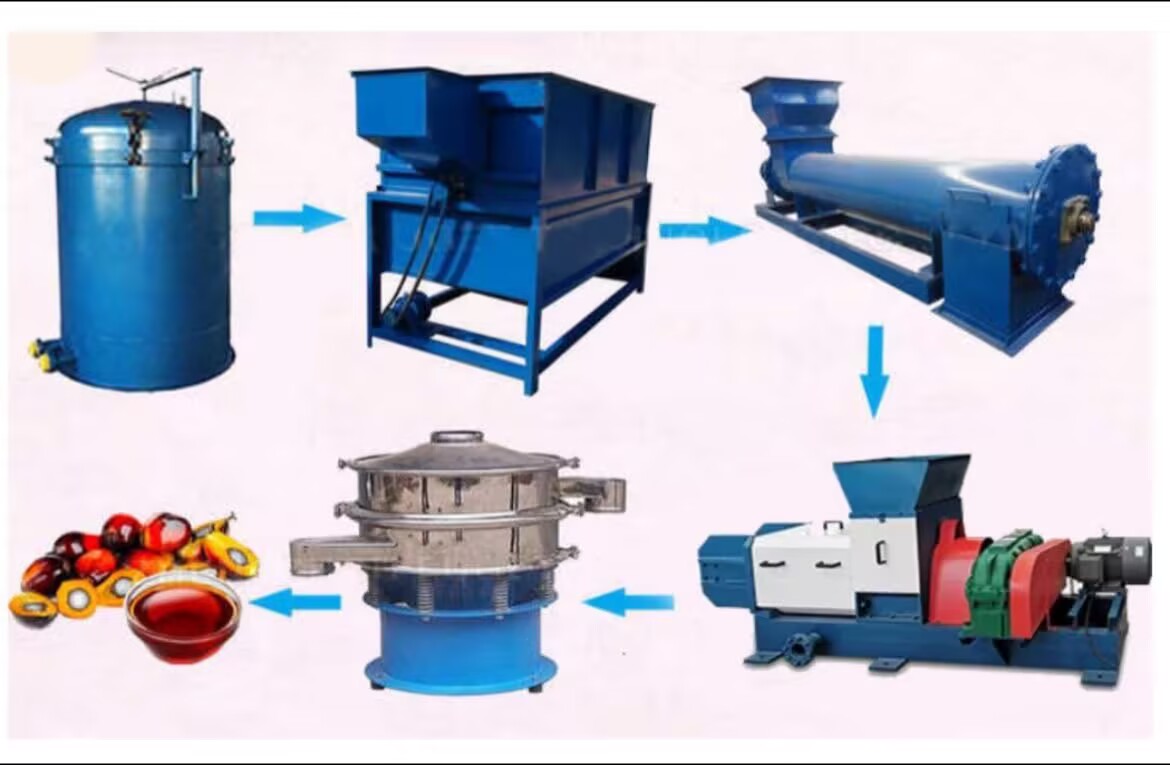
Palm is a tropical plant It is a vegetable oil variety with a large amount of production, consumption and trade at present. It is called “the world’s three major vegetable oils” together with rapeseed oil and soybean oil. It has been edible for more than five thousand years history Palm oil is squeezed from the palm fruit on the oil palm tree, and the pulp and kernel produce palm oil and palm kernel oil respectively. Palm kernel oil is made by Sheller, Conveyor, Oil Press machine, Roasting, Oil The palm oil production line composed of Filter Machine can help companies increase productivity and save time.
1-5TPH Complete Set Palm Oil Processing Line is newly and specially designed by QIE Machinery engineers. 1-5tph small scale palm oil processing machine adopts international advanced and mature palm oil extraction technology to extract palm oil. It is suitable for small palm oil mill and palm oil production business. What’s more, this kind of palm oil processing machinery with low cost and high production rate.

1-5 TPH Palm oil processing line is a complex process which includes palm fruit reception station, palm fruit sterilizing station, palm fruit threshing station, palm fruit digesting & pressing station and palm oil clarification station. Each palm fruit station works together can maximize the extraction of palm oil.
Oil pressing plant from palm fruit basically includes: fruit threshing, sterilizing / digesting, oil pressing and filtering. Among all these processing sections, oil pressing and filtering must be done by professional facilities (palm oil extractor and oil filter press), while the other sections can be selected depending on your needs and financial status. It is certainly that a complete palm oil mill has higher automatic degree and needs fewer labor. Only 2~3 worker is needed to run the whole line. Besides, it can also avoid the unstable material feeding caused by manual control. (Related Post: How to Establish a Palm Oil Mill Plant in Nigeria>>)

Fresh Palm Fruit Reception: It is used for temporary storage and unloading fresh palm fruit bunches from palm plantation.
Palm Bunch Sterilization with the aid of steam: this loosens the oil-containing fruit from the bunch and inactivates lipid-degrading enzymes as well as micro-organisms that naturally occur in FFB.
Palm Fruit Threshing, bunch stripping which separates the fruit from the bunch stalk and spikelets. In this process, the byproduct Empty Fruit Bunch (EFB) is produced..
Palm Fruit Digestion to crush and disrupt the mesocarp (pulp), with the aid of steam.
Palm Fruit Oil Pressing of the digested fruit to extract the oil from the mesocarp fibre. In this process, two fractions are produced: raw oil and a residue, containing palm oil fibres and nuts.
Clarification and drying: The crude palm oil is separated from the mixture of oil, water and solid impurities by clarifying equipment, and other impurities are removed.
Crude Palm Oil Refining: The deacidified palm oil is refined, including bleaching, deodorization, dehydration and other processes to further improve the quality of the palm oil.
For a commodity that is sold in the global market, one tonne of palm oil costs about $550. So what is the expected profit margin of selling palm oil? Well, if a good machine is used during the extraction process in a small scale palm oil plant, about 25 % of oil is usually extracted from the fruit bunch and this means that in order for you to produce 10 tonnes of palm oil, you need some fresh fruit bunch of about 40 tonnes. The processing of a single batch including the fermentation process takes about 3-4 days. Taking into account weekends where there isn’t any work, you will have around 12 days of a pure palm-oil output and this means that you will have about 120 tonnes of palm oil monthly. Machines, on the other hand, are not usually 100% effective and most of them have 90-95% efficiency. This means you can have around 100 tonnes of oil monthly. As previously mentioned, a tonne costs around $550, therefore the total for a month will be: 100 x $550 = $55,000